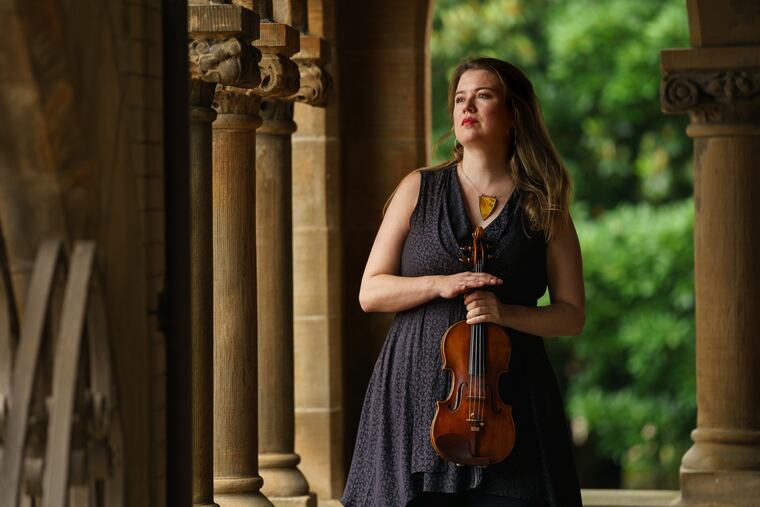As Pa. legislature weighs child sex abuse reforms, acclaimed violinist joins fight for statute of limitations changes
For victims like Lara St. John, where the alleged sexual abuse happened decades ago, advocates say legal recourse is hard to come by.

Lara St. John, the famed violinist who alleged that she was sexually abused by her teacher at the prestigious Curtis Institute of Music in the 1980s, on Monday joined calls for statute of limitation reform in Pennsylvania, the same day the legislature moved on a compromise still criticized as not going far enough.
“The most important thing for me, obviously, is just justice for people who were children at the time,” St. John said at a news conference Monday, standing alongside CHILD USAdvocacy executive director Kathryn Robb and CEO Marci Hamilton. “It does take a long time to be able to come out. For me, it was 34 years ago, when I was 14 years old, that I was abused and raped by my teacher at the Curtis Institute in Philadelphia.”
In an Inquirer investigation, St. John said that her professor, Jascha Brodsky, repeatedly sexually assaulted her and that the school’s dean mocked her when she relayed what happened. Four other women, who asked to remain anonymous, also said Brodsky sexually pursued them while they were students at Curtis in the 1980s.
For victims of decades-ago sexual abuse, legal recourse is hard to obtain, advocates say, and St. John is among a growing chorus calling for the legislature to make sweeping changes. On Monday, a state Senate committee moved on bills that would make it easier for victims to seek justice.
Pennsylvania law says criminal charges for child sexual abuse must be brought before the victim turns 30, and civil lawsuits before the victim is 50. These restrictions were widely criticized after a 2018 grand jury report detailing decades of child sexual abuse by 300 named Catholic priests in Pennsylvania and systemic cover-up, yet only two of those priests were charged because of the statute of limitations.
Despite a push from advocates last year, the state Senate failed to reach a compromise on allowing victims to file lawsuits for child sexual abuse that occurred decades ago.
State Rep. Mark Rozzi (D., Berks), who previously argued for changing laws to give abuse victims an additional two years to bring civil claims, is now taking a different approach. He’s pushing to amend the state constitution, something that could take years, to change the statute of limitations law.
» READ MORE: From champion to ... pariah? Pa. lawmaker behind clergy abuse reform on the outs with some victims
The Senate Judiciary Committee on Monday approved measures that raise the age of victims for civil suits to 55, remove the statute of limitations for criminal cases, and call for a two-year window for victims to file civil suits against offenders and institutions if the statute of limitations has expired.
This window would only occur, according to the proposed legislation, if it becomes a constitutional amendment, meaning it must be approved in two consecutive sessions of the General Assembly and then put to voters.
» READ MORE: Senators weigh altering child sex abuse lawsuit time limits
The bills will now go to the Senate floor for a vote expected this week.
“Mark and I are standing together, not as victims, not as survivors, but as thrivers,” said State Rep. Jim Gregory (R., Blair), one of the sponsors. “We’re moving forward, and I just hope that everyone can come together and realize this is for the sake of the victims.”
At the news conference Monday, Robb and Hamilton said the constitutional amendment route would take too long to institute changes needed years ago. They also pointed to how the state Supreme Court temporarily blocked the Marsy’s Law constitutional amendment that would give more rights to crime victims and their families, and argued the same could happen with this proposed legislation.
“It is a road to nowhere,” Robb said. “And it is cruel to the survivors in this commonwealth.”
Rozzi said he believed the bills would get through the legislature and be approved by voters in a referendum. Though this process takes time, Rozzi said, it is the “safe and most certain route” so that the statute of limitations changes “would be upheld as constitutional.”